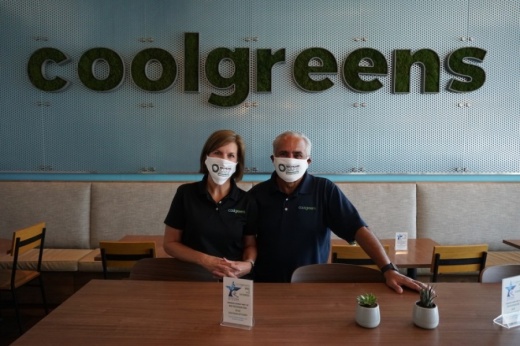 On a recent weekday morning, as people perused the shops lining Southlake Town Square, signs of the ongoing coronavirus pandemic were evident.
On a recent weekday morning, as people perused the shops lining Southlake Town Square, signs of the ongoing coronavirus pandemic were evident.Shopkeepers and patrons all wore masks. Strips of tape patterned the sidewalk, serving as social distancing markers for those waiting in lines. Hand sanitizer stations were ubiquitous.
Mark Guilbert, Southlake Chamber of Commerce president and CEO, said local businesses are putting a lot of effort into making shoppers feel safe.
“Local businesses have just done a fantastic job. They’ve been trying to restore confidence that it’s safe to shop in Southlake,” Guilbert said. “They’ve responded very well with offering all kinds of options, ... [such as] online, curbside, delivery.”
The chamber and the city of Southlake have stepped up their efforts as well by launching two initiatives to help local businesses navigate this new environment.
The programs
The first program, called Southlake Safe, offers COVID-19 resources to any business that pledges to adhere to certain health and safety guidelines. Businesses that take the pledge are included in an online directory that promotes those practices. The businesses also receive a kit with personal protective equipment and a Southlake Safe decal to display in their store.
“Representatives from the city came by and gave us a really cool box of things, like a thermometer and masks and sanitizer,” said Shanna Argote, owner of Cool Greens, which took the pledge.
Resources like this can be of particular use to small business owners, said Frank Bliss, president of Cooper Company, the group credited with building Southlake Town Square.
“The great thing about having a Southlake Safe program is if you’re a small business and you’re not part of a big national organization that has been ... promoting safe practices, ... it gives you a nice playbook that you could tap into,” Bliss said.
As of this paper’s print deadline, 67 businesses had taken the Southlake Safe pledge.
“I heard about it through the chamber of commerce. ... You had to really think about it,” Argote said. “We had to answer a lot of questions and make sure that we ... had standards of ... sanitation, wearing gloves, [wearing] masks, ... along with just the cleanliness of our store.”
The other program provides members of the Southlake Chamber of Commerce with one-on-one mentoring sessions with City Council members.
“There’s people of diverse skill sets and backgrounds that are very talented on our ... City Council,” Guilbert said.
This free mentoring is available to chamber members on a first-come, first-served basis.
As of this paper’s print deadline, the first round of businesses was scheduling their one-on-ones.
“We’re going to offer you three hours of mentorship, online, in person, to help get your business back up and running,” Mayor Laura Hill said in a July 31 video.
 Business recovery
Business recoveryMany businesses took a hit during the early months of the coronavirus pandemic. The city of Southlake saw the results clearly in its sales tax collections, which plunged as compared with earnings the previous year.
Those numbers have since seen an uptick, according to August reports from the Texas Comptroller’s Office. The city saw a 7.9% year-over-year increase in tax collections for sales generally made during the month of June.
But the struggle is not over.
“COVID-19 has created this ... health apocalypse where ... we’ve seen an unprecedented number of bankruptcies where retailers aren’t going to the courts to liquidate. They’re going to the courts to restructure,” Bliss said.
Attorney Doug Skierski of Dallas-based legal firm Skierski and Jain helps businesses through a host of legal issues. His primary piece of advice for business owners on shaky financial ground is to seek counsel early.
“The ... most common mistake we see is a business waiting until ... the day before the bank is going to foreclose or the landlord is going to lock them out,” Skierski said in an Aug. 26 video conference.
Bliss said programs such as Southlake Safe and City Council’s business assistance program help in the exchange of best practices. For restaurant owners, Bliss said, that could include simplifying menus and offering curbside pickup and delivery.
“My food was really meant to be consumed ... fresh out of the kitchen, and it may or may not travel as well. So how do I modify my menu so that I’ve got fewer items that can deliver a more consistent result?” he said.
That is where the programs can help, he said.
“All of these things that we can do to collaborate, I think, will help small businesses or any business navigate these really, really difficult waters,” Bliss said.





